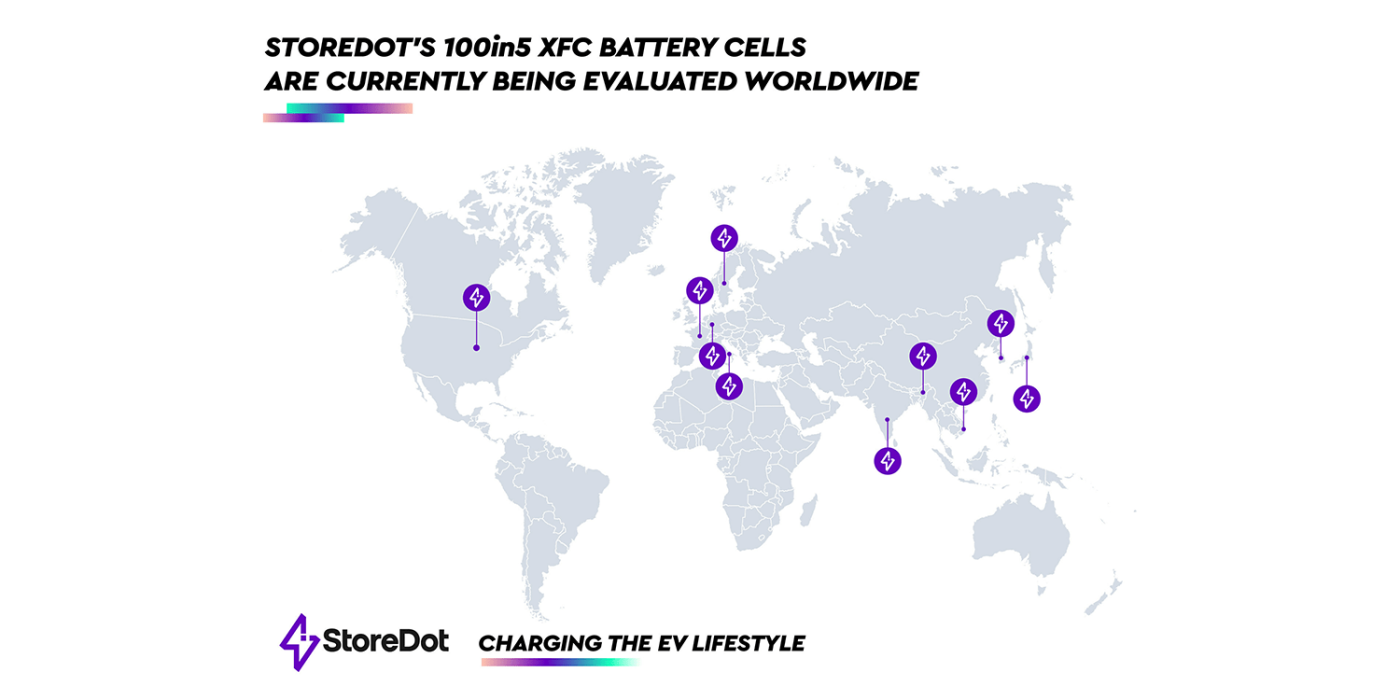15 OEMs are testing StoreDots fast-charging battery cells
StoreDot’s fast-charging silicon-dominated battery cells are already being tested under real-life conditions by 15 car brands from Europe, Asia and the USA. According to the Israeli battery developer, initial test results confirm the fast-charging capability of the cells.
++ This article has been updated. Kindly continue reading below. ++
StoreDot does not name individual names in the press release. Instead, the Israeli company published a world map showing the locations where the cells are being tested. Unsurprisingly, these include Sweden, India and Vietnam – there are publicly known cooperations with Volvo, Polestar, Ola Electric and VinFast, and some of these companies also have a financial stake in StoreDot.
Other markers are set in the USA, France, Germany, Italy, South Korea and Japan, for example. For some of the countries mentioned, there are not many carmakers that would come into question – in France, for example, there is the Renault Group and the French Stellantis brands, in South Korea mainly the Hyundai Motor Group with Hyundai, Genesis and Kia. From Germany, the then Daimler Group had invested in StoreDot at an early stage. So whether the marking in Germany is Mercedes as an evaluation partner is obvious, but not confirmed.
Other potential partners are to be added this year, StoreDot said. “This announcement is yet another important milestone for StoreDot,” says company CEO Doron Myersdorf. “We’re delighted that so many of the world’s leading automotive manufacturers are testing both our XFC cells and their integration into next generation electric vehicle architectures, and we are receiving positive feedback about the real-world viability of our technologies.”
StoreDot aims to put its ‘100in5’ battery cells, which are designed to enable the recharging of electricity for 100 miles (160 kilometres) in five minutes, into mass production in 2024 in partnership with Chinese manufacturer Eve Energy. With Italvolt, a European production partner is ready, but there is no official indication of the start of production here yet.
StoreDot’s battery development focuses on a special silicon anode technology and the associated software integration. The goal is to develop an extremely fast charging technology – in March 2022, the Israeli company presented their technology roadmap ‘100inX’. The next step is to reduce this duration to three minutes by 2028, before only two minutes are to be required by 2032.
Update 13 April 2023
StoreDot has released new information on the potential battery downsizing that is to be made possible by the above-mentioned ‘100in5’ battery cells. According to the Israeli company, an “average premium vehicle” could switch from an 80 kWh to a 50 kWh battery pack for identical performance. This would reduce the weight of the e-vehicle by about 200 kilograms and the construction costs by about 4,500 dollars, StoreDot estimates. Further, StoreDot predicts: “The environmental impact of such a design change will be highly significant too as it will lower amount of raw materials used in each vehicle, reducing its EV carbon footprint throughout its lifecycle.”
prnewswire.com, prnewswire.com(update)




